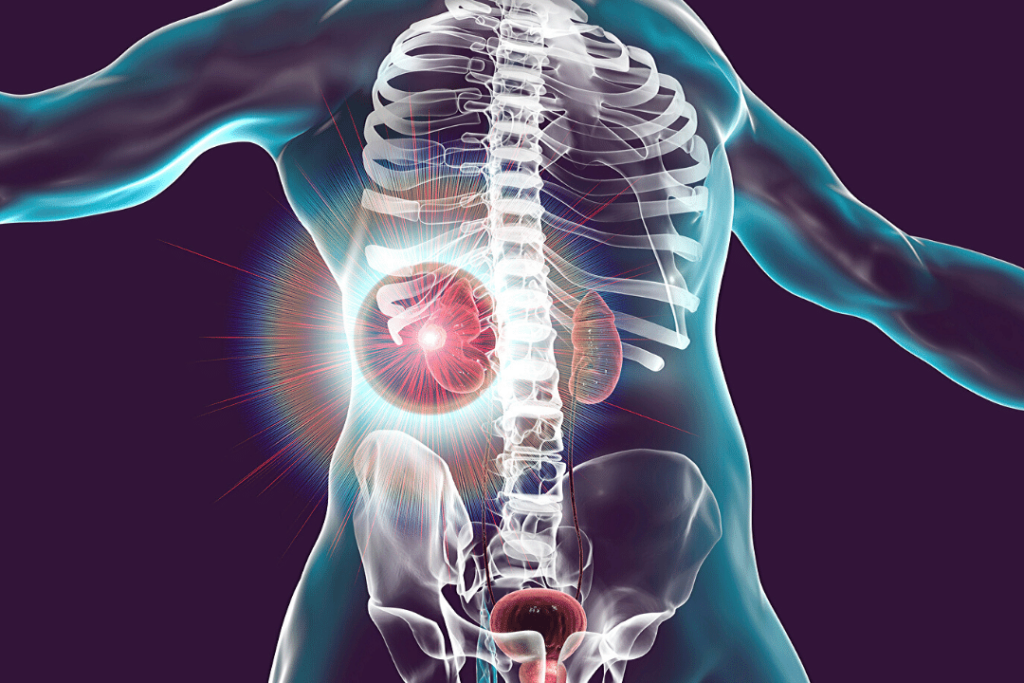What is Kidney Cancer?
The kidneys are two bean-shaped organs around the size of your fists, which sit towards on either side of the spine, towards your back between your ribs and pelvis.
Blood passes through the renal arteries to each kidney where waste materials and some water are filtered out to form urine. This passes to the bladder through tubes called ureters. Urine is then passed via the urethra when we go to the toilet.
The filtered blood is sent back to the heart, where it continues to be circulated throughout the body.
Kidney cancer is where the cells of the kidney become malignant (cancerous) and grow out of control, forming a tumor. The most common form of kidney cancer is Renal Cell Carcinoma (also sometimes referred to as Renal Adenocarcinoma), where cancer begins in the tiny tubes (tubules) inside the kidney. RCC accounts for over 80% of kidney cancers.
A less common form of kidney cancer is Transitional Cell Cancer (TCC), which develops in the central part of the kidney called the Renal Pelvis. This is the funnel-shaped area of the organ where the urine is collected before being passed through the ureter to the bladder.
What Are the Signs and Symptoms of Kidney Cancer?
In the early stages, there are generally very few symptoms. As a tumor gets larger, the following symptoms may be experienced:
- Blood in the urine
- Persistent pain in the side/back below the ribs
- A mass, lump or swelling in the kidney region
- Fatigue
- Unexpected weight loss
- Loss of appetite
- High blood pressure
- High temperature
Causes and Risk Factors
Several factors can increase a person’s risk of developing this form of cancer. Please remember that having one or more of the risk factors below does not necessarily mean that you are likely to get the disease.
The most common risk factors for kidney cancer are:
- Smoking – Those who use tobacco are much more at risk; smokers are over 50% more likely to get kidney cancer than non-smokers.
- Obesity – Those who are overweight are more at risk, especially in developing Renal Cell Carcinoma (RCC).
- Workplace Exposure – Some studies have suggested that there is a link between exposure to workplace substances such as cadmium, some herbicides, and solvents that contain Trichloroethylene.
- Age – Kidney cancer is more common in older people.
- Family History and Genetics – Close family members of people who have had kidney cancer, are more likely to get the disease themselves. Several inherited conditions increase the risk, such as Von Hippel-Lindau disease, papillary renal cell carcinoma, leiomyoma-renal cell carcinoma, Birt-Hogg-Dube (BHD) syndrome, Familial renal cancer, and renal oncocytoma.
- High Blood Pressure – Those with high blood pressure are more at risk of getting kidney cancer, although it is unclear as to whether the medications that are used to treat it or the high blood pressure itself or even a combination, could be the root cause.
- Gender – Men are twice as likely to develop Renal Cell Carcinoma as women.
5 Year Survival Rates
The figures below give us an indication of the number of people who lived for at least 5 years after being diagnosed with kidney cancer.
Localized – cancer only in the kidneys themselves: 93%
Regional – cancer that has spread to other nearby tissues of the body: 70%
Distant – cancer that has spread, or metastasized, to distant organs and tissues: 12%
*statistics from the SEER database for kidney cancer patients between 2009 and 2015.
As with any cancer, the sooner it is discovered and treated, the better the outlook. For further information on available treatments, please see our recommended kidney cancer treatment page.
Treating Kidney Cancer – The Budwig Way
As always, the Budwig Method focuses on whole-body and mind health for the optimum base for healing. We encourage a healthy diet and lifestyle, with the addition of Dr. Budwig’s cancer-fighting muesli mix.
At the Budwig Center, we recognize the importance of emotional wellbeing and the effect that has on physical and mental health. We use a variety of emotional healing techniques as well as physical therapies to help treat cancer – put simply, people who have a healthy baseline in mind, spirit, and body, are better able to heal and recover.
We’re always ready to discuss ways to help you manage cancer and give you the best chance for a natural recovery. Contact our expert advisors at the Budwig Center to talk about a personalized plan.
For more information on our natural treatments for cancer, head to the Budwig Center YouTube channel.
